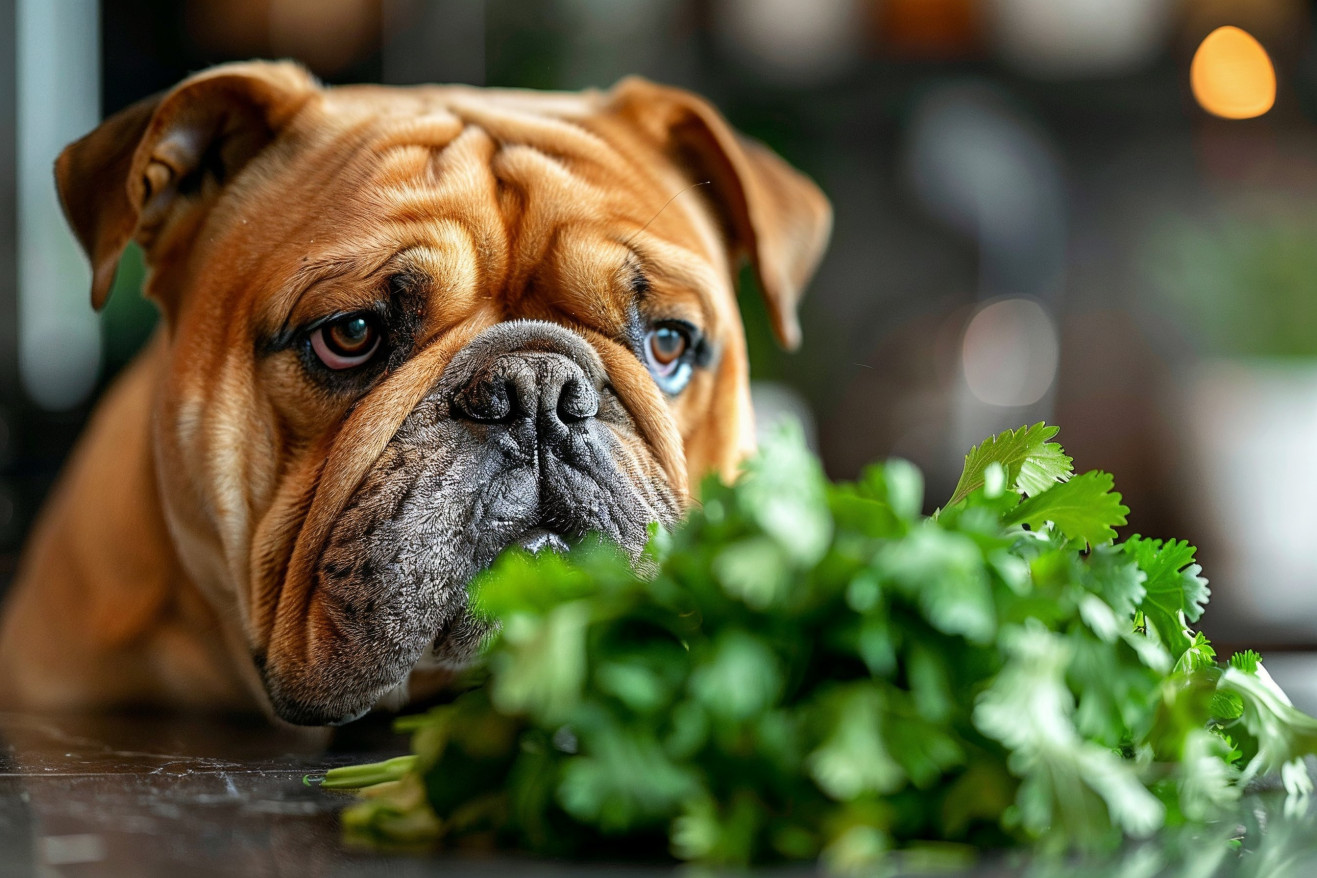Can Dogs Eat Cilantro? Potential Risks and Benefits Explained
21 February 2024 • Updated 20 February 2024

Cilantro is a popular herb that can add a burst of flavor to many of our favorite dishes, but is it safe for our furry friends to eat? While cilantro is not poisonous to dogs, it is safe for dogs to eat in small amounts. It is a source of vitamins A, C, and K, and minerals like potassium.
However, cilantro should be introduced to your dog slowly and carefully to ensure that they don’t have any negative reactions to it. As always, you should talk to your vet before introducing new foods to your dog’s diet.
This article will take a deep dive into what veterinary nutritionists and animal studies have found about the impact of cilantro on dogs. We will look at nutritional analyses and studies on the impact of cilantro on the digestive systems of dogs from reputable sources to learn about the potential benefits and risks of feeding dogs cilantro.
By the end of this article, you will have the information you need to decide whether or not to add cilantro to your dog’s diet.
Can dogs eat cilantro?
Nutritional Value of Cilantro for Dogs
In addition to its taste, cilantro, or coriander, is a rich source of vitamins and minerals that are important for your dog’s health. According to the American Kennel Club, cilantro contains calcium, magnesium, vitamin K, vitamin A, and vitamin C, all of which are important for vision, blood clotting, the immune system, and bone health.
In addition, Team Kabo points out that cilantro is high in antioxidants, which help to fight free radicals in the body.
As with any new food, it’s important to introduce cilantro to your dog’s diet slowly. This will help you determine if your dog has any sensitivities or allergies to the herb.
It will also help you ensure that you don’t give your dog too much cilantro at once, which could cause digestive issues.
To start, sprinkle a small amount of finely chopped cilantro leaves (leaving out the stems, which are harder to digest) on top of your dog’s regular food. This will help you ensure that you’re giving them the right amount. If you do this, you should notice that your dog has fresher breath and improved digestion, which are two of the benefits of cilantro that we mentioned earlier.
Know the Potential Risks of Cilantro for Your Dog
While cilantro is not poisonous to dogs, it is important to know the potential risks and side effects of feeding it to your pet. The American Kennel Club notes that giving cilantro in large amounts can cause gastrointestinal upset in dogs. The fibrous stems are especially difficult to digest and can cause problems, so it is best to stick to the leaves.
If your dog experiences symptoms like vomiting, diarrhea, or a loss of appetite after eating cilantro, Fetch’s in-house vet, Dr. Aliya McCullough, says that you should take your dog to the vet. These symptoms are a sign that your dog may be intolerant or allergic to cilantro.
To avoid any issues, start by feeding your dog a small amount of washed, raw cilantro. Watch your dog closely for any signs of a reaction, and always talk to your vet before adding cilantro to your dog’s diet on a regular basis. This will help ensure that your dog doesn’t experience any negative side effects and that cilantro can be a healthy addition to their diet.
Cilantro vs. Other Herbs for Dogs
If you’re trying to figure out which herbs are safe for dogs, you’re not alone. BeChewy explains that cilantro is one of the few herbs that’s safe for dogs and can help with eye health, immune support, and even digestion.
This is in stark contrast to chives and garlic, which, as Dutch explains, can lead to anemia and stomach upset in dogs. While cilantro is safe for dogs in moderation, not all herbs are.
Preventive Vet explains that it’s important to know when and how to use herbs for dogs, noting that while variety is important, it needs to be balanced with knowledge. This is because some plants can be toxic to dogs, and pet parents need to be careful about what they feed their pets.
For example, while oregano is safe for dogs in small amounts, it can be toxic in large amounts and when used as an oil, leading to stomach upset.
In other words, while cilantro can be a good thing, it’s important to make sure that you’re using herbs in a way that’s tailored to your dog’s health and dietary needs. This way, pet parents can make sure that their dogs are getting the benefits of herbs like cilantro without the potential risks of other, less safe herbs.
How Dogs Digest Cilantro
Dogs have a digestive system that’s designed to be able to handle a wide range of foods, including plant-based options like cilantro. However, their ability to digest these foods is still based on their ancestry as carnivores.
According to a paper published in PMC, when dogs were domesticated, they were given the genes necessary to digest starches from their wolf ancestors, which allowed them to evolve to eat a diet that included more starches during the agricultural revolution. These genes help dogs break down starches, which means that dogs can digest small amounts of plant-based foods, including cilantro.
That said, the Clinical Nutrition Team at Cummings School of Veterinary Medicine at Tufts University explains that while dogs are adaptable, some may still be sensitive or allergic to certain plant-based foods. If a dog has digestive issues, like vomiting or diarrhea, after eating cilantro, it may be a sign that they have a food intolerance or allergy to the herb.
If you’re concerned about digestive problems, make sure to add cilantro to your dog’s diet slowly and in small amounts. Vetericyn explains that dogs have a faster digestive system than humans, with the entire process taking about eight hours.
Because of this, you can monitor your dog for any issues during this time and make sure that you’re able to control and recognize any digestive problems that may arise from eating cilantro.
Going Green: Cilantro and Plant-Based Diets for Dogs
As the world of dog nutrition continues to change, plant-based foods are becoming increasingly important. While dogs are descended from wolves and are therefore classified as carnivores, research has shown that dogs can meet some of their nutritional needs with plant-based foods.
This is where herbs like cilantro come in, as adding cilantro to a dog’s diet can help them get the vitamins and minerals they need, making it a great addition to a well-rounded diet.
A recent systematic review in PMC has shown that the popularity of vegetarian pet diets is on the rise, mirroring the trend in human diets. While dogs have historically eaten meat, they can be healthy on a well-balanced plant-based diet, as long as it’s formulated to avoid deficiencies in essential amino acids and micronutrients.
A study in PLOS ONE even suggests that nutritionally adequate vegan diets could be one of the healthiest options for dogs if they’re properly formulated and balanced.
This ongoing discussion about what dogs should eat has led to a variety of expert opinions, including those of Sarah Dodd, who notes that plant-based diets can be a good option if they’re properly fortified.
While cilantro can’t be a dog’s sole diet, it’s an example of a plant-based food that can be used to supplement a dog’s meals, helping them meet their many nutritional needs. With the goal of a balanced diet that includes a variety of foods, the key to a dog’s diet is still balance, with each component, including cilantro, contributing to a dog’s overall nutritional needs.
Conclusion: Can Dogs Eat Cilantro?
As dog owners, we always want to make sure we are doing the best for our furry friends, and cilantro is a safe and healthy herb that can be added to a dog’s diet in moderation. Studies have shown that cilantro is a good source of vitamins and antioxidants that can help support a dog’s overall health.
That said, it’s important to remember that moderation is key. By introducing cilantro slowly and in small amounts, you can make sure it’s a positive addition to your dog’s diet.
As we’ve covered, it’s always best to talk to a vet before you make any changes to your dog’s diet, including adding cilantro. A vet can help make sure that any changes you make to your dog’s diet are appropriate for their specific health and nutritional needs.
With the right care and knowledge, herbs like cilantro can be a great way to add variety and balance to your dog’s diet, helping to make sure they live long, happy lives. So, the next time you sprinkle a little cilantro on your dog’s food, think of it as more than just a garnish and instead as a small way to help support their health.


